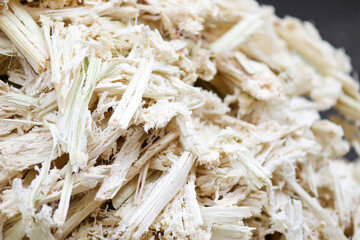What Is Sugarcane Bagasse?
Bagasse is a byproduct created during the process of extracting juice from sugarcane. During this process, sugarcane is crushed and the juice is collected, leaving stalks behind that can be easily turned into bagasse. Since bagasse is essentially sugarcane fiber, it can then be used instead of other fibers like wood or straw as paper pulp in the paper product-making process.

Sugarcane Bagasse Pulp
This photo shows Sugarcane Bagasse after it has been pressed to extract the sugarcane’s juice. The pulp is then refined for the production of goods.
A Brief History of Sugarcane Bagasse
Clarence Birdseye discovered the use of sugarcane bagasse as a paper pulp substitute in the 1930s. The bagasse paper-making method was then used and further developed in a small laboratory in Peru, part of a sugar mill called Hacienda Paramonga.
In tropical and subtropical climates where sugarcane production is high — including countries like Argentina, China, Colombia, India, Iran, and Thailand — the use of sugarcane bagasse as a paper pulp substitute is well-implemented. Although also usable as fuel to sustain the sugar mill production process, bagasse has been found to be more suitable to paper production due to its high moisture content.
The Eco-Friendly Properties of Sugarcane Bagasse
Why is sugarcane bagasse a greener alternative to using wood fibers in the paper industry? Check out the various eco-friendly properties of bagasse below.
Reused Material — Since bagasse is a byproduct of the sugarcane industry, reusing it in the paper-making process reduces the amount of waste produced by sugar mills. Being able to reuse this material to create paper products versus harvesting new materials for paper pulp also reduces deforestation, rendering the paper-making process more eco-friendly.
Easier Bleaching — Since bagasse is easier to bleach than the normal wood fibers typically used in the paper-making process, it requires less chlorine to achieve the bright whiteness of printer or notebook paper. After the cooking process of bagasse that turns it into black pulp, the pulp goes through the washing process three times to change its color. The process of making wood pulp white for paper creation is more complex and uses more chemicals, making it have a larger negative environmental impact.
Compostable Products — Sugarcane bagasse is often used to make paper products that are fully biodegradable within 90 days of composting. Green Paper Products has a wide range of compostable products made from this type of reused content.
High-Quality Disposable Bagasse Paper Products
Green Paper Products provides bagasse paper products for various disposable uses. If you require one-time-use products but want to make more eco-friendly purchasing decisions, contact us to learn more, or check out a selection of our sugarcane bagasse paper products below!
To-Go Clamshells — We offer multiple sizes of to-go clamshell containers. Whether you’re looking for burger boxes, hoagie boxes, or larger containers with one or three compartments, we have to-go containers you and your customers will love.
Compostable Plates — We have several options for buying compostable paper plates made from sugarcane bagasse. We offer various sizes of round plates as well as three partition plates and larger oval plates.
Bowls & Trays — Our compostable soup/salad bowls come in various sizes to suit your specific needs, as do one of our burrito bowls, which are a customer favorite! We also have heavy-strength bagasse to-go food trays, taco trays, and even some school lunch trays.
Are Compostable Products Right For Me?
Compostable products are tested to meet the ASTM 6400 or 6868 standards for commercial composting. They are intended for disposal in commercial composting facilities and will not break down in a landfill or other environments. Commercial composting is not available in all areas, and different states have different requirements for composting. Please check locally to ensure you have access to commercial composting before purchasing compostable products.